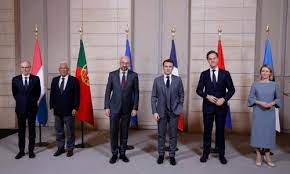Government offices in EU can ban wearing of religious symbols, court rules

Brussels: Government offices across the EU can ban employees from wearing religious symbols, such as Islamic headscarves, in the interest of neutrality, the EU’s top court has ruled, though it stressed that such restrictions must be applied equally to all employees and fit within the legal context of each member state.
The decision, published by the court of justice of the European Union on Tuesday, said such bans were permissible in order to enforce an “entirely neutral administrative environment”.
However, the court said that bans on clothing or symbols linked to philosophical or religious beliefs had to be applied evenly. “Such a rule is not discriminatory if it is applied in a general and indiscriminate manner to all of that administration’s staff and is limited to what is strictly necessary,” it said.
The court was asked to rule after a Muslim employee in the municipality of Ans, eastern Belgium, was told she could not wear a headscarf at work. Court documents noted her job involved little contact with the public.
Soon after, the municipality amended its terms of employment to require that all employees observe strict neutrality. The employee lodged a complaint with a local court, describing the ban as discriminatory and voicing concerns that her right to freedom of religion had been infringed.
The court noted that although overt signs of religious conviction were barred, several photographs produced by the complainant made it clear that “discreet signs of conviction were tolerated”.
These symbols included the wearing of earrings with a cross or the holding of Christmas parties, the complainant’s lawyer told the Guardian.
The court turned to the EU, asking the court of justice to assess whether the neutrality rule was discriminatory.
In a decision that holds for public sector offices across the EU, the Luxembourg-based court said a policy of strict neutrality “may be regarded as being objectively justified by a legitimate aim”.
It noted, however, that the reverse would also stand: public administrations could be justified in allowing employees to wear visible signs of belief, whether religious or philosophical, in a general and indiscriminate way.
National courts had a “margin of discretion”, it added, allowing them to best decide how to balance the rights of the individual and the neutrality of the public service. “However, that objective must be pursued in a consistent and systematic manner, and the measures adopted to achieve it must be limited to what is strictly necessary,” it said.
Sibylle Gioe, the lawyer representing the employee in Belgium, highlighted the ambiguity of the court’s ruling. “European Union law does not opt for one solution over another,” she said. “And I was expecting something like that.”
News of the ruling sparked concerns in some quarters. Femyso, a pan-European network representing more than 30 Muslim youth and student organisations, described the ruling as potentially infringing on the freedom of religion and expression.
“Despite being neutrally cloaked, bans on religious symbols invariably target the headscarf,” the organisation said, citing a 2022 paper from the Open Society Foundations that argued that these bans rest on Islamophobic discourses that portray Islamic dress as incompatible with neutrality.
The ruling could exacerbate the marginalisation of Muslim women at a time when Islamophobia was on the rise, it said, adding: “Muslim women already face intersectional discrimination on multiple grounds, and such a ruling risks legitimising their removal from public life.”
The organisation called for “workplace inclusivity, where individuals of all faiths can participate fully without fear of discrimination, including Muslim youth”.
Tuesday’s decision echoed several rulings previously issued by the same court. In 2021 it ruled that private sector employers could limit the expression of religious, political or philosophical beliefs when there was a “genuine need” to “present a neutral image towards customers or to prevent social dispute”.
One year later it said that such bans do not constitute “direct discrimination” as long as they are applied equally to all employees.
Among those who criticised the 2021 decision was Human Rights Watch. “Muslim women shouldn’t have to choose between their faith and their jobs,” Hillary Margolis, of the organisation, said in a statement at the time.
Such restrictions, she said, were often focused on Muslim women who wore headscarves or face veils, and rested on a flawed logic: “That a client’s objections to employees wearing religious dress can legitimately trump employees’ rights.”





